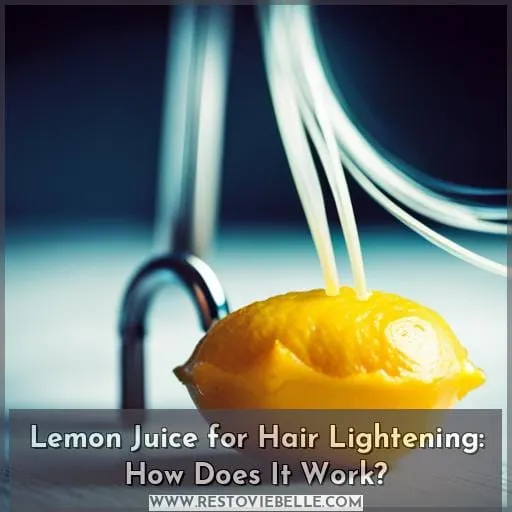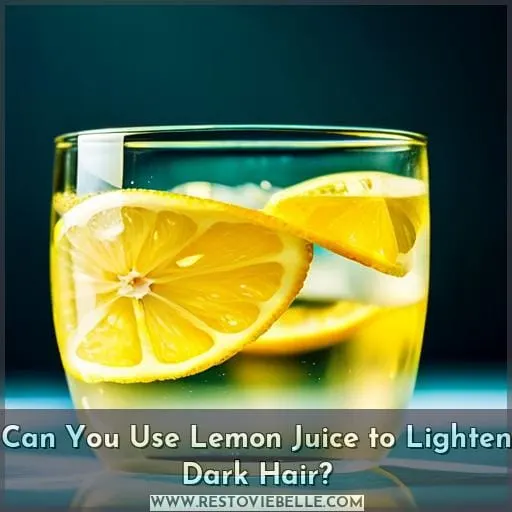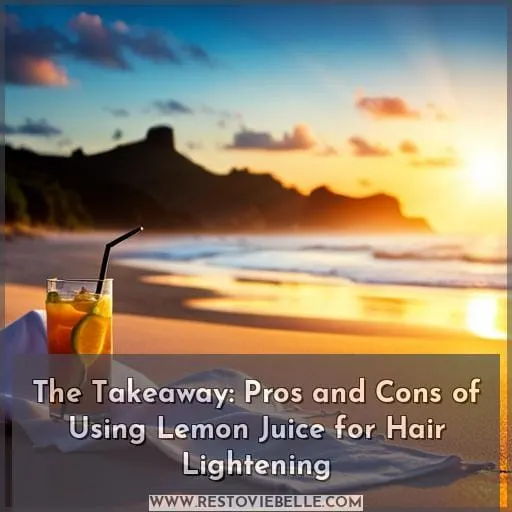This site is supported by our readers. We may earn a commission, at no cost to you, if you purchase through links.
 Are you looking for a new hair color but not ready to commit? Lemon juice could be the perfect solution. Using lemon juice as a natural lightening agent has been around since ancient times, and its popularity continues today.
Are you looking for a new hair color but not ready to commit? Lemon juice could be the perfect solution. Using lemon juice as a natural lightening agent has been around since ancient times, and its popularity continues today.
With this article, we’ll explain how to use lemon juice for hair lightening and look at both the pros and cons of using it in order to achieve lighter locks without harsh chemicals or damage. We will also discuss whether it is effective on dark hair, what risks there are with using this method, plus tips on how long one should expect results that last.
So if you’re curious about brightening up your tresses naturally with citrus fruit power – get ready because this guide is all about learning how best to lighten your hair with lemon juice!
Table Of Contents
- Key Takeaways
- Lemon Juice Plus Sun Exposure Does the Trick
- Can Reduce Scalp Itchiness, Dryness, and Flaking
- How to Apply Lemon Juice for Hair Lightening
- Lemon Juice for Hair Lightening: How Does It Work?
- Can You Use Lemon Juice to Lighten Dark Hair?
- How to Effectively Use Lemon Juice to Lighten Hair
- The Takeaway: Pros and Cons of Using Lemon Juice for Hair Lightening
- Love DIY Beauty? Make Your Own Hair Masks and Dry Shampoo
- Frequently Asked Questions (FAQs)
- Are there any risks associated with lightening hair with lemon juice?
- How often can I use lemon juice to lighten my hair?
- What should I do to protect my hair while using lemon juice to lighten it?
- Is it possible to lighten my hair more than one shade with lemon juice?
- How can I prevent a brassy tone after lightening my hair with lemon juice?
- Conclusion
Key Takeaways
- Lemon juice is a natural lightening agent for hair when combined with sun exposure.
- Lemon juice can be mixed with warm water and sprayed onto damp hair before sitting in the sun.
- Lemon juice has other benefits, such as strengthening strands and improving scalp pH balance.
- Deep conditioning the hair after using lemon juice is important to restore moisture.
Lemon Juice Plus Sun Exposure Does the Trick
By combining citric acid from lemon juice with sun exposure, you can naturally and safely achieve a lighter hair color without spending a fortune at the salon. Lemon juice contains natural bleaching agents that help to lighten the melanin in your hair when exposed to UV rays.
This reaction boosts the effect of sunlight on your tresses, allowing for a gradual yet noticeable change in hue over time.
For best results, mix lemon juice with warm water and spray it onto damp hair before sitting out in direct sunlight for 1-2 hours while wearing sunscreen as protection against harmful UV rays. Not only will this process give you great blonde highlights, but it also provides numerous other benefits.
Applying daily spritzes is fine too, especially while away on vacation. However, be sure not to forget deep conditioning afterwards so that moisture levels are restored back into locks, thus preventing damage caused by excessive dehydration or breakage where possible.
Can Reduce Scalp Itchiness, Dryness, and Flaking
You may be familiar with using lemon juice as a natural way to lighten hair, but it can also help reduce scalp itchiness, dryness, and flaking due to seborrheic dermatitis. It is also effective in reducing excessive oil secretion on the scalp. Lemon juice’s acidic properties make it an ideal treatment for these issues without resorting to harsh chemicals or medications.
Seborrheic Dermatitis Treatment
When trying to treat Seborrheic Dermatitis, you can try using lemon juice for its antifungal properties and ability to balance the pH of your scalp – just like a breath of fresh air!
Lemon juice is a natural bleaching agent that contains citric acid, which gradually whitens hair. It’s also an excellent source of Vitamin C, which can help strengthen hair and promote growth.
To use it as part of your treatment plan, mix lemon juice with warm water in a spray bottle. Then, spritz over affected areas two times per week. Allow the solution to sit on your scalp for 10 minutes before rinsing off with cold water, followed by shampoo and conditioner.
Not only will this reduce dandruff, but it may also help reduce any irritation or flaking caused by seborrheic dermatitis while giving you softer locks at the same time! Just remember not to use bleach as an alternative because this could worsen symptoms if used too often.
Excess Oil Reduction
Applying lemon juice to your scalp can help reduce excessive oil production and keep it healthy. To do this, mix the juice from one lemon with warm water in a spray bottle and apply it onto damp hair. This helps balance the pH of your scalp, which is important for reducing excess oil secretion.
Additionally, lemon juice contains vitamin C that strengthens hair follicles, promoting growth while also adding moisture back into strands after lightening procedures like seborrheic dermatitis treatments or DIY methods such as using a natural alternative like bleach-free lemon juice.
When finished spritzing with this solution on your head, be sure to rinse out any remaining residue so you don’t end up smelling like a fruit bowl! Don’t forget to deep condition afterwards too – it’ll replenish lost nutrients and hydrate locks for softness without leaving behind an unpleasant citrus scent when done properly.
It’s essential to follow safety precautions when lightening hair with lemons: take breaks between sessions, use sunscreen, condition deeply afterwards, and rinse immediately if dryness occurs.
Take care of yourself – both inside and out – by incorporating healthier lifestyle choices, including proper haircare routines that won’t damage tresses over time!
How to Apply Lemon Juice for Hair Lightening
Lightening your hair with lemon juice is a natural, cost-effective solution to achieving lighter locks. To do so, you’ll need some fresh lemons and a spray bottle filled with warm water mixed with lemon juice.
First, wet the sections of hair that you want to lighten and spritz them generously with the mixture from the spray bottle. Then, sit in direct sunlight for 1-2 hours while wearing sunscreen for protection – repeat this process until the desired lightening is achieved.
Required Materials
To lighten your locks, you’ll need a few simple items: fresh lemon, warm water, and a spray bottle. For extra protection against the sun’s UV rays, slather on sunscreen before commencing with the natural alternative to bleach.
Wet your hair and spritz the desired sections with the lemon juice mixture. Sit in direct sunlight for 1-2 hours or until dry, then rinse thoroughly to remove any acidic residue from your tresses.
To replenish the moisture lost during the lightening process, be sure to deep condition afterward. Also, use a leave-in conditioner for added benefits such as softness and shine restoration.
With these tips in hand, you’re ready to safely achieve lighter locks without breaking the bank!
Step-by-Step Instructions
Follow these steps to take your hair from drab to fab with a natural lightener like lemon juice!
- Squeeze the lemon juice into a bowl and add warm water.
- Mix the solution together and pour it in a spray bottle.
- Spritz onto damp hair, focusing on areas you want to lighten.
- Sit in the sun for 1-2 hours, wearing sunscreen for activation of the lemon juice mixture.
Rinse out after achieving the desired color; deep condition afterwards so that your scalp stays hydrated and healthy during this process! Wash away any remaining residue or scent of citrus left over by shampooing twice before conditioning again deeply at least once per week.
After application, make sure you use protection such as leave-in conditioners or oils, which can counteract the drying effects caused by citric acid found within lemons themselves.
Lemon Juice for Hair Lightening: How Does It Work?
Using lemon juice to brighten your locks is a simple way to give your hair an instant boost in color without spending hundreds of dollars at the salon. Lemon juice contains natural citric acid, which works as a bleaching agent that gradually whitens and lightens hair when combined with sun exposure.
It’s best for blondes or those with dark blonde hair looking to add brightness and vibrancy – but it can also be used on light highlights and color-treated hair.
Here are three reasons why lemon juice is the perfect choice for naturally lighter locks:
- The acidic properties of lemon juice balance out pH levels on the scalp while its antifungal properties help treat dandruff, reduce excessive oil secretion, and combat itchiness caused by dryness or flaking skin.
- Vitamin C found in lemons strengthens strands while helping promote growth from root to tip – plus you get all this goodness from just one fruit!
- Lastly, UV rays activate its high acidity level which further breaks down pigment molecules leaving you with lighter tresses after several applications – no need for harsh chemical bleach!
When using DIY treatments like this one remember to take extra care of your mane so it doesn’t become damaged under repeated processing; deep condition afterward whenever possible too! If done right though there’s nothing quite as liberating as achieving beautiful results at home – saving time & money along the way!
Can You Use Lemon Juice to Lighten Dark Hair?
You may have heard that lemon juice can be used to lighten hair. It’s true – the citric acid in lemons is a natural bleaching agent, and when combined with sun exposure, it can help change your hair color without salon visits or expensive treatments.
The short answer is yes – though with some caveats! Darker strands will take longer to lighten than lighter ones. The effects of using lemon juice on brunette locks are often more subtle than they would be if you were trying to go from blonde to platinum.
Also, because of its high acidity level, UV light activates the acidic properties in lemon juice and helps alter your hair’s pigment further – but this could lead to an undesirable red-orange/brassy hue if not monitored carefully.
Lemon juice also contains vitamin C, which strengthens each strand while promoting growth. Thus, making it a cost-effective solution for DIY beauty enthusiasts looking for results without breaking their budget.
To get started safely at home, apply freshly squeezed lemon onto dampened strands, then sit out in direct sunlight (with sunscreen) for one hour up until desired results have been achieved – ensuring breaks between sessions so as not to damage delicate cuticles or dry out the scalp too much.
After use, always deep condition afterward, restoring hydration back into parched tresses before indulging again another time.
So, if you wish to go blond naturally during lockdown, remember to manage expectations, monitor progress along the way, and keep conditioned!
How to Effectively Use Lemon Juice to Lighten Hair
Using lemon juice to lighten your hair can be an effective way to achieve some sun-kissed highlights, as long as you take the necessary precautions. The duration of the lightened effect will depend on how often and regularly it is used – but remember that using lemon juice on dark hair may not produce a noticeable result or could even cause brassy tones.
Be sure to follow all safety steps such as wearing sunscreen and deep conditioning afterward in order to protect your scalp and prevent damage from occurring.
Duration of Lightened Effects
The effects of lemon juice lightening can be temporary, so it’s important to take extra care in protecting your locks. Use natural ingredients and professional advice when lightening dark hair. Take steps to prevent damage to the hair and scalp.
Deep condition regularly after using lemon juice for hydration. Tone blonde or lighter colored hair with a shade opposite its underlying pigment for better results. Don’t leave on the mixture too long as this may result in dry and brittle strands over time.
It is essential that you understand how long you can expect these lightened effects to last before going ahead with any treatment involving Lemon Juice Lightening. It may not always yield immediately noticeable results, but if done correctly, it will slowly enhance your desired color change over multiple applications.
Gradually fading out until the need for reapplication under sunlight exposure arises again.
Risks and Precautions
Be mindful of the risks associated with using lemon juice to alter your hair color and take precautions to ensure maximum safety. To maximize the safe use of lemon juice, make sure you’re only exposed to UV light for a short amount of time – no more than two hours per session.
After rinsing out the mixture from your hair, it’s important to deep condition it in order to moisturize and repair any damage caused by citric acid or heat activation on blonde hair strands. Additionally, regular conditioning is highly recommended as this will help improve scalp pH balance while controlling itchiness, dryness, and flaking due to its antifungal properties and reducing excessive oil secretion.
Make sure not to overdo treatments; use them sparingly with breaks between sessions so that no further damage occurs! Finally, remember: when done properly, using lemon juice can be an effective way to achieve sunny highlights without bleaching or damaging your locks too much – just don’t forget about sun protection!
The Takeaway: Pros and Cons of Using Lemon Juice for Hair Lightening
Though you may be tempted to try this at-home hair lightening technique, it’s important to weigh the pros and cons of using lemon juice for a brighter shade.
Lemon juice is an effective but potentially damaging brightening treatment that can lead to toning effects on different hair types and colors. When applied correctly, lemon juice can improve scalp health by reducing itchiness, dryness, or flaking as its citric acid content balances pH levels.
Vitamin C found in the citrus fruit helps strengthen strands and promote growth when used as part of your regular beauty routine – just mix with chamomile tea before applying onto damp locks.
However, there are downsides. Due to its high acidity level, it deteriorates cuticle layers leading to color pigment reduction. Plus, over time, blonde hues become brassier, which requires toning with opposite shades if desired results aren’t achieved quickly enough after three or four applications already completed.
What’s more, the drying effect from lemon juice might leave your mane feeling brittle, so remember to rinse off immediately after exposure along with deep conditioning afterwards!
DIY enthusiasts should bear in mind these factors alongside making their own masks & dry shampoo before deciding on whether this natural alternative suits them best for getting salon-worthy looks without splashing out cash unnecessarily.
Love DIY Beauty? Make Your Own Hair Masks and Dry Shampoo
Try making your own hair masks and dry shampoo to switch up your beauty routine! DIY recipes allow you to craft the perfect beauty product for any hair type, using natural ingredients that are gentle on color-processed locks.
From repairing damage caused by color processing treatments or lightening with lemon juice, homemade products can effectively address many of our at-home beauty needs.
When it comes to crafting a customized hair mask or dry shampoo recipe, there are three main components: a base ingredient like coconut oil or aloe vera gel; an essential oil that adds shine and fragrance; and other additives such as honey for added moisture.
For best results when experimenting with DIY recipes, always consult with a professional colorist first so they can advise on what’s best for maintaining healthy tresses long term.
DIY home remedies give us more control over how we care for our manes – from brightening blond highlights without damaging them further through harsh chemicals in store-bought dyes, to adding volume without weighing down strands.
With careful research into which ingredients work well together (such as lemon juice’s ability to lighten blonde shades), it is possible to create beautiful looks while nourishing one’s scalp and promoting growth all at once!
Frequently Asked Questions (FAQs)
Are there any risks associated with lightening hair with lemon juice?
Lightening your hair with lemon juice can cause some risks, such as dryness and breakage. Lemon juice is acidic, and its high acidity level may deteriorate the cuticle layer of the hair, reducing color pigment.
Additionally, it can strip away natural oils from your scalp, which might lead to itchiness or flaking. To protect yourself against these risks, deep condition your hair after rinsing out lemon juice mixtures and use sunscreen for sun exposure protection.
How often can I use lemon juice to lighten my hair?
To get the best results, use lemon juice sparingly and take breaks in between lightening sessions.
What should I do to protect my hair while using lemon juice to lighten it?
To protect your hair while lightening it with lemon juice, you should rinse it out immediately after drying and deep condition to restore moisture and repair damage.
Is it possible to lighten my hair more than one shade with lemon juice?
Yes, it is possible to lighten your hair more than one shade with lemon juice. However, the effectiveness will depend on your hair color and type. Be sure to take regular breaks between lightening sessions and deep condition afterward for best results.
How can I prevent a brassy tone after lightening my hair with lemon juice?
After lightening your hair with lemon juice, deep condition it to restore moisture and prevent a brassy tone. Use leave-in conditioners to counteract the drying effects of citric acid, avoid excessive sun exposure, and finish by toning your hair for optimal results.
Conclusion
The sun-lemon juice hair lightening combo is a great way to brighten up your hair without the harsh effects of bleach. With the right technique and precautions, you can safely lighten your hair with lemon juice and sun exposure.
Use it sparingly, however, as lemon juice is acidic and can dry out hair and scalp, leading to breakage.
When it comes to using lemon juice to lighten hair, it’s important to understand that different hair types and colors react differently. Dark hair may not see a noticeable result or may experience a brassy result. Redheads may notice more brightness and vibrancy with lemon juice.
And of course, the lighter your hair is naturally, the more effective lemon juice will be as a lightener.
If you’re looking for an inexpensive way to lighten your hair, lemon juice is a great option. Just be sure to take care of your hair’s health with regular deep conditioning and use it sparingly.














